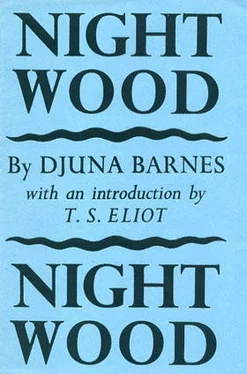She said, ‘I’ve never known it before—I thought I did, but it was not knowing at all.’
‘Exactly,’ said the doctor, ‘you thought you knew, and you hadn’t even shuffled the cards—now the nights of one period are not the nights of another. Neither are the nights of one city the nights of another. Let us take Paris for an instance, and France for a fact. Ah, Mon Dieu! La nuit effroyable! La nuit, qui est une immense plaine, et le cœur qui est une petite extrémité! Ah, good Mother mine, Notre Dame-de-bonne-Garde! Intercede for me now, while yet I explain what I’m coming to! French nights are those which all nations seek the world over—and have you noticed that? Ask doctor Mighty O’Connor; the reason the doctor knows everything is because he’s been everywhere at the wrong time and has now become anonymous.’
‘But,’ Nora said, ‘I never thought of the night as a life at all—I’ve never lived it—why did she?’:"
‘I’m telling you of French nights at the moment,’ the doctor went on, ‘and why we all go into them. The night and the day are two travels, and the French—gut-greedy and fist-tight though they often are—alone leave testimony of the two in the dawn; we tear up the one for the sake of the other, not so the French.
‘And why is that, because they think of the two as one continually, and keep it before their mind as the monks who repeat, “Lord Jesus Christ, Son of God, have mercy upon me!” Some twelve thousand or more times a twenty-four hours, so that it is finally in the head, good or bad, without saying a word. Bowing down from the waist, the world over they go, that they may revolve about the Great Enigma—as a relative about a cradle—and the Great Enigma can’t be thought of unless you turn the head the other way, and come upon thinking with the eye that you fear, which is called the back of the head; it’s the one we use when looking at the beloved in a dark place, and she is a long time coming from a great way. We swoon with the thickness of our own tongue when we say, “I love you,” as in the eye of a child lost a long while will be found the contraction of that distance—a child going small in the claws of a beast, coming furiously up the furlongs of the iris. We are but skin about a wind, with muscles clenched against mortality. We sleep in a long reproachful dust against ourselves. We are full to the gorge with our own names for misery. Life, the pastures in which the night feeds and prunes the cud that nourishes us to despair. Life, the permission to know death. We were created that the earth might be made sensible of her inhuman taste; and love that the body might be so dear that even the earth should roar with it. Yes, we who are full to the gorge with misery, should look well around, doubting everything seen, done, spoken, precisely because we have a word for it, and not its alchemy.
‘To think of the acorn it is necessary to become the tree. And the tree of night is the hardest tree to mount, the dourest tree to scale, the most difficult of branch, the most febrile to the touch, and sweats a resin and drips a pitch against the palm that computation has not gambled. Gurus, who, I trust you know, are Indian teachers, expect you to contemplate the acorn ten years at a stretch, and if, in that time, you are no wiser about the nut, you are not very bright, and that may be the only certainty with which you will come away, which is a post-graduate melancholy—for no man can find a greater truth than his kidney will allow. So I, doctor Matthew Mighty O’Connor, ask you to think of the night the day long, and of the day the night through, or at some reprieve of the brain it will come upon you heavily—an engine stalling itself upon your chest, halting its wheels against your heart; unless you have made a roadway for it.
‘The French have made a detour of filthiness—Oh, the good dirt! Whereas you are of a clean race, of a too eagerly washing people, and this leaves no road for you. The brawl of the Beast leaves a path for the Beast. You wash your brawl with every thought, with every gesture, with every conceivable emollient and savon, and expect to find your way again. A Frenchman makes a navigable hour with a tuft of hair, a wrenched bretelle , a rumpled bed. The tear of wine is still in his cup to catch back the quantity of its bereavement; his cantiques straddle two backs, night and day.’
‘But, what am I to do?’ she said.
‘Be as the Frenchman, who puts a sou in the poor box at night that he may have a penny to spend in the morning—he can trace himself back by his sediment, vegetable and animal, and so find himself in the odour of wine in its two travels, in and out, packed down beneath an air that has not changed its position during that strategy.
‘The American, what then? He separates the two for fear of indignities, so that the mystery is cut in every cord; the design wildcats down the charter mortalis, and you get crime. The startled bell in the stomach begins to toll, the hair moves and drags upward, and you go far away backward by the crown, your conscience belly out and shaking.
‘Our bones ache only while the flesh is on them. Stretch it as thin as the temple flesh of an ailing woman and still it serves to ache the bone and to move the bone about; and in like manner the night is a skin pulled over the head of day that the day may be in a torment. We will find no comfort until the night melts away; until the fury of the night rots out its fire.’
‘Then,’ Nora said, ‘It means—I’ll never understand her—-I’ll always be miserable—just like this.’
‘Listen! Do things look in the ten and twelve of noon as they look in the dark? Is the hand, the face, the foot, the same face and hand and foot seen by the sun? For now the hand lies in a shadow, its beauties and its deformities are in a smoke —there is a sickle of doubt across the cheek bone thrown by the hat’s brim, so there is half a face to be peered back into speculation. A leaf of darkness has fallen under the chin and lies deep upon the arches of the eyes; the eyes themselves have changed their colour. The very mother’s head you swore by in the dock is a heavier head, crowned with ponderable hair.
‘And what of the sleep of animals? The great sleep of the elephant, and the fine thin sleep of the bird?’
Nora said: ‘I can’t stand it, I don’t know how—I am frightened. What is it? What is it in her that is doing this?’
‘Oh, for God’s sake!’ the doctor said, ‘give me the smelling salts.’ She got up, looking among the debris on the stand. Inhaling, he pushed his head back into the pillow, then he said:
‘Take history at night, have you ever thought of that, now? Was it at night that Sodom became Gomorrah? It was at night, I swear! A city given over to the shades, and that’s why it has never been countenanced or understood to this day. Wait, I’ll be coming to that! All through the night Rome went burning. Put that in the noontide and it loses some of its age-old significance, does it not? Why? Because it has existed to the eye of the mind all these years against a black sky. Burn Rome in a dream, and you reach and claw down the true calamity. For dreams have only the pigmentation of fact. A man who has to deal in no colour cannot find his match, or, if he does, it is for a different rage. Rome was the egg, but colour was the tread.’
‘Yes,’ said Nora.
‘The dead have committed some portion of the evil of the night; sleep and love, the other. For what is not the sleeper responsible? What converse does he hold, and with whom? He lies down with his Nelly and drops off into the arms of his Gretchen. Thousands unbidden come to his bed. Yet how can one tell truth when it’s never in the company? Girls that the dreamer has not fashioned himself to want, scatter their legs about him to the blows of Morpheus. So used is he to sleep that the dream that eats away its boundaries finds even what is dreamed an easier custom with the years, and at that banquet the voices blend and battle without pitch. The sleeper is the proprietor of an unknown land. He goes about another business in the dark—and we, his partners, who go to the opera, who listen to gossip of café friends, who walk along the boulevards, or sew a quiet seam, cannot afford an inch of it; because, though we would purchase it with blood, it has no counter and no till. She who stands looking down upon her who lies sleeping knows the horizontal fear, the fear unbearable. For man goes only perpendicularly against his fate. He was neither formed to know that other nor compiled of its conspiracy.
Читать дальше












